Dec 2020 Edition
Dec 2020 Edition Joy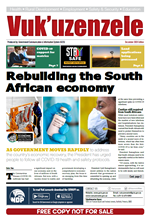
Translations
Be healthy this festive season
Be healthy this festive season JoyGive yourself the gift of good health this holiday period by watching what you eat.
 The festive season in South Africa is a time of soaking up the sun, enjoying a cold one with friends and feasting on delicious meals.
The festive season in South Africa is a time of soaking up the sun, enjoying a cold one with friends and feasting on delicious meals.
Unfortunately, many people overeat and eat unhealthy food over this time, which can pose health risks to a lot of people, especially those with already existing chronic conditions such as high blood pressure, high cholesterol or gout.
To keep healthy, the KwaZulu-Natal Department of Health advises the public to monitor what they eat as it may not always be good for their well-being.
Making good choices
Eating the correct amount of the correct kinds of foods will meet all of a person’s nutritional needs and boost resistance to diseases and stress. Do not eat lots of salt because it can cause high blood pressure.
Although some health conditions are hereditary and are passed from one generation to another, many ailments are caused by poor nutrition and a lack of exercise. Called ‘lifestyle diseases’, these include heart conditions and high blood pressure which can result in heart attacks and strokes, diabetes, gall bladder complaints and liver, kidney and skin diseases.
Eating a variety of foods that are not too fatty, too sweet or too salty, with enough fibre, will help keep you healthy.
Your diet should include small portions of protein, such as meat, fish, chicken and eggs; dairy such as milk; good fibre from foods such as lentils and dried beans; and fruit and vegetables. Avoid fatty meat or oily food, sweetened foods, refined grain products such as white bread and large quantities of tea or coffee.
You must also drink about eight glasses of water each day because water is essential to good health. It dilutes the urine and prevents kidney damage from a high concentration of waste products.
The effects of not following a healthy diet can include serious health consequences, such as obesity, which worsens other diseases and strains a person’s joints.
Rather than binge eating at social gatherings, it is better to have three daily meals of more or less the same size.
COVID-19 support for positive matric learners
COVID-19 support for positive matric learners UrsulaMatrics will still be able to write their final exams if they test positive for COVID-19. 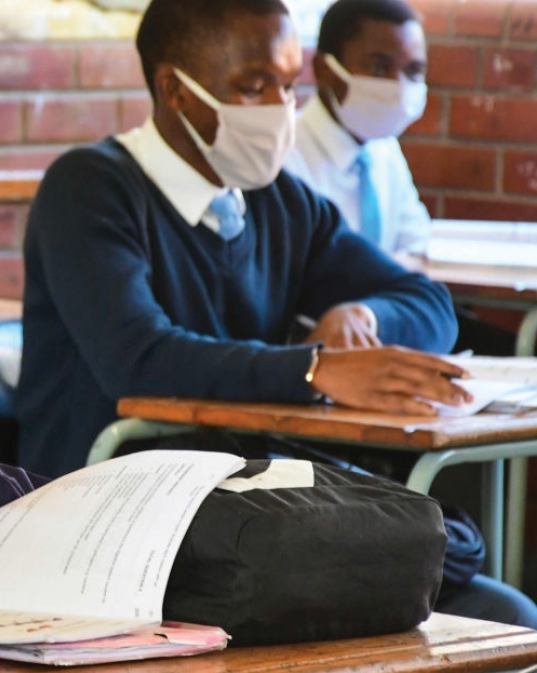
The departments of Health and Basic Education (DBE) are working together to ensure that matric learners who test positive for the Coronavirus Disease (COVID-19) or are a close contact of a positive case, can write their final National Senior Certificate examinations if they are well enough to do so.
The number of cases is expected to be small and each case should be dealt with individually. This will require close collaboration between health and education officials at provincial, district and local levels.
A circular issued by the Department of Department of Health states that these learners are expected to self-isolate at home or in an isolation or quarantine facility, in line with current guidelines, and will only be permitted to leave isolation or quarantine to write their exams.
They will write at a different venue and under secure conditions that comply with exam regulations.
According to the circular:
- The venue should be well ventilated, allow for appropriate physical distancing and be cleaned daily in line with the DBE's COVID-19 protocols.
- Compliance with physical distancing, the wearing of masks, hand-washing and other hygiene practices are critical. Compliance must be ensured before, during and after an exam.
- Invigilators must also comply with the regulations and be provided with medical masks.
- The DBE remains responsible for conducting and overseeing the exams and will provide guidance regarding the collection and management of exam papers.
Arrangements must be made to ensure that learners do not pose a transmission risk to others during travel to and from the venue. They can walk or use private transport. Where these options are not possible, health and education officials should work together to provide alternative arrangements.
The DBE has also issued a circular and sent protocols to schools for the management of possible and confirmed COVID-19 cases during the exams, as many who become infected will be asymptomatic and unaware that they are infected.
The key to limiting transmission is to ensure physical distancing, wearing of masks and appropriate hygiene practices.
Parents or guardians must inform the school principal immediately if their child tests positive, so that arrangements can be made to write at an isolation venue.
Chickens provide extra income for a young mom
Chickens provide extra income for a young mom SiboneloThanks to her entrepreneurship and the additional support government gave to vulnerable people to cushion them from the impacts of the Coronavirus lockdown, Andile Simelane (25) is now the owner of a registered business, Andiey Projects Pty (LTD).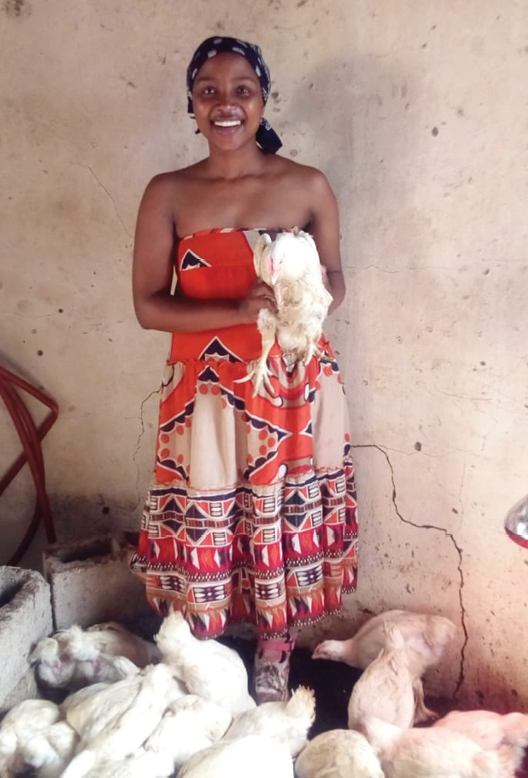
The Nongoma, KwaZulu-Natal resident, who is a final-year public relations student at the University of South Africa’s Durban campus – and now also a micro chicken producer, says the additional money gave her the opportunity to better provide for her daughter.
She says when President Cyril Ramaphosa announced that there was going to be an additional R500 for Child Support Grant recipients, she saw it as her opportunity to start saving so she could start a side business.
Simelane registered her business in June. Once she had saved R2 000, in September, she bought 50 day-old chicks, feed and the lights that she needed to get started.
Simelane has sold 15 chickens for a total of R400 and plans to sell the rest as braaied meat at a shisanyama.
The announcement by President Ramaphosa of the Economic Reconstruction and Recovery Plan could not have come at a better time for Simelane. She says one of the factors that motivated her to start a business was the level of unemployment among her peers in her village.
The plan aims to ‘reindustrialise our economy, focusing on growing small businesses’. Simelane plans to use the opportunities presented by the presidential plan to grow her business so that she can create jobs.
“I want to create jobs in my area, just like my father, who is a businessman, has done. The Economic Reconstruction and Recovery Plan will make it possible for small business owners like myself to grow their businesses into big commercial enterprises.”
Simelane says that she will use her profits to buy more chickens, while also putting some aside for her daughter’s education.
“I want to grow the business, hire people and enrol my daughter at a good school,” she says.
Don’t forget about HIV during COVID-19
Don’t forget about HIV during COVID-19 UrsulaHealth Minister Dr Zweli Mkhize has urged all South Africans to be tested for HIV and, if positive, to take their medication correctly. 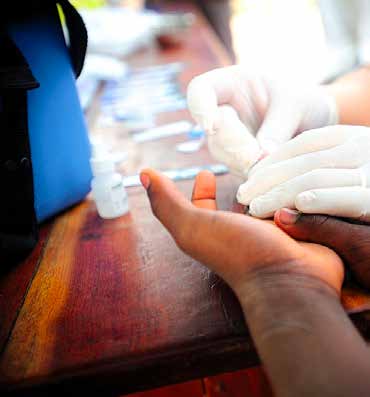
This is because if you know your HIV status and take your treatment properly, you will remain virally suppressed, with a strong immune system. “This plays a crucial role in protecting you from contracting other diseases, including the Coronavirus Disease (COVID-19),” says Dr Mkhize.
“This is why we came up with the campaign called Cheka Impilo (Know your health status). This campaign is designed to remind you that the power of healing is in your hands and that we are here to reach out, guide and assist you in every way so you can reach your full life potential,” he says.
Dr Mkhize says that as we approach World AIDS Day, we need to remind ourselves that HIV and AIDS is still a pandemic in this country, more threatening than COVID-19.
“Knowing one’s HIV status will assist in the management of the disease if one is HIV positive. You can get treatment and live a long and healthy life,” he adds.
He is concerned because the COVID-19 pandemic has made people reluctant to seek medical care for other conditions, like HIV. According to Dr Mkhize, HIV testing fell by 46% between April and June.
Dr Mkhize says it is now time for the country to refocus on the other diseases that kill thousands each year, and not just COVID-19.
Successes
Launched in 2005, South Africa has the world’s largest antiretroviral therapy (ART) programme, which has helped reduce the number of AIDS-related deaths.
In July 2019, the Joint United Nations Programme on HIV/AIDS (UNAIDS) said that South Africa had successfully reduced new HIV infections by more than 40% and AIDS-related deaths by around 40% since 2010.
South Africa has also been praised for its progress in meeting the UNAIDS's 90-90-90 goals, which aim for 90% of people to know their HIV status, 90% to be virally supressed and 90% to be on ARVs.
In 2018, it was announced that the country had reached the first 90% when over 90% of people living with HIV in South Africa were found to be aware of their HIV status. In 2019, UNAIDS confirmed that three districts in KwaZulu-Natal had reached 90-90-90, well before the target of 2020. The districts are Ugu, Umzinyathi and Umkhanyakude. Earlier this year, Dr Mkhize said that Harry Gwala had also reached this milestone.
Get tested and take your meds
UNAIDS says a person may feel perfectly healthy for several years after becoming infected with HIV, and may be at risk of passing the virus on to others.
South African AIDS organisation AVERT says testing is the only way to know for sure if you have HIV. Knowing your status means you can keep yourself and your sexual partners healthy and start treatment early, which gives you a better chance of living a long and healthy life.
AVERT says it is important to take your medication at the right time every day or the level of HIV in your blood may increase and the treatment may stop working. This is known as developing drug resistance.
It says ART reduces the level of HIV in your blood so that it cannot damage your immune system, which helps your body fight infections.
Drink water to avoid dehydration
Drink water to avoid dehydration JoySevere heat and not drinking enough fluids can lead to dehydration and heatstroke, which can be fatal.
According to the Western Cape Department of Health, the summer heat brings with it a high risk of dehydration, which is a harmful loss of water in the body.
Dehydration is usually caused by not drinking enough liquids to replenish the water lost by sweating. It can also be caused by an illness, that causes vomiting or diarrhoea; and by sweating from a fever.
The loss of body fluids does not only occur during hard physical activities, but can also result from walking, gardening or riding a bike, especially in hot or humid conditions.
When you are dehydrated, your body cannot function as usual. Children younger than five, the elderly and people working outdoors are especially vulnerable to dehydration and heatstroke (a condition caused when your body overheats).
Heatstroke is a medical emergency. Seek medical help immediately for any of these symptoms:
- Feeling confused or your speech starts to become slow and unclear.
- Nausea and vomiting.
- Rapid, shallow breathing.
- Heart starts to race.
- A throbbing headache.
Dehydration warning signs
Some of the early warning signs of dehydration include:
- feeling thirsty and lightheaded.
- a dry mouth.
- tiredness.
- having dark coloured, strong-smelling urine.
- passing urine less often than usual.
To stay hydrated and avoid heatstroke you should:
- drink more water than you usually do on hot days.
- stay inside or in shaded areas.
- wear a wide rim hat or use an umbrella.
- always carry a bottle of water with you and drink regularly.
- take regular breaks from the sun if you work outside.
- cool yourself down by using a spray bottle.
Babies and children
Parents and caregivers should pay extra attention to children and babies, to make sure they are hydrated.
Breastfeeding moms should feed their babies more frequently when it is very hot.
Keep children indoors or in the shade, dress them in light clothing and wipe them down with a damp cloth to help them stay cool. Remember to apply sunscreen when they go outdoors.
If children younger than five have watery stools, keep vomiting and are tired, seek medical help immediately. Also seek immediate medical care if your baby is unable to breastfeed or has sunken eyes and a sunken soft spot (fontanelle) on its head.
In children, other dehydration warning signs include:
- a dry or sticky mouth.
- few or no tears when crying.
- urinating less or fewer wet nappies than usual.
- dry, cool skin.
- irritability.
- drowsiness or dizziness.
Employment opportunities for young people
Employment opportunities for young people JoyAs part of President Cyril Ramaphosa’s Presidential Employment Stimulus Programme, the basic education sector aims to create 200 000 employment opportunities for education assistants and 100 000 for general school assistants.
This, according to the Department of Basic Education (DBE), will be accomplished through the Basic Education Employment Initiative (BEEI).
Provincial education departments have already started issuing advertisements to recruit qualifying candidates for this initiative using a wide variety of media platforms. Interested parties are urged to look out for the adverts in all provinces.
The BEEI seeks to address Coronavirus Disease (COVID-19) academic disruptions as well as some of the lingering systemic challenges.
Education assistants will support teachers in the classroom and provide extra support to learners. General school assistants will help schools to comply with COVID-19 protocols while ensuring that teaching and learning take place in a safe, secure and hygienic environment.
The 300 000 employment opportunities are targeted at youth between the ages of 18 and 35 years old. Recruitment will take place at the community level, with schools required to prioritise candidates living near the school.
“An orientation manual has been prepared and digitised to ensure that the young people get trained on their roles and responsibilities.
“In addition, various training programmes have been prepared to equip successful candidates with skills that will ensure they are ready to take up their duties as well as ensuring that they gain meaningful experience to improve their employability, beyond participating in the BEEI,” the department said.
The young people will start working in public schools across the country from 1 December 2020. The DBE has partnered with Harambee Youth Employment Accelerator to digitise the recruitment processes across the provinces.
“Through this partnership, candidates will be able to apply for the employment opportunities via SAYouth.mobi.
“An added benefit for the young people who register on the mobisite will be that they will gain access to many other employment opportunities, linked to their education, skills and experiences. SA Youth uses each work seeker's data to match them to opportunities and as they gain experience and skills, presents them with further opportunities,” the department said.
Accessing the BEEI employment opportunities can be done through sayouth.datafree.co/p/dbe. This is a zero-rate mobisite that can be accessed through a mobile phone. Candidates without access to the Internet can call the toll-free number: 0800 727272.
From trash to riches!
From trash to riches! UrsulaAfter sending out his CV with no luck of securing a job for six years, a Katlehong man ignored the raised eyebrows of friends and family, and decided to become a waste picker. 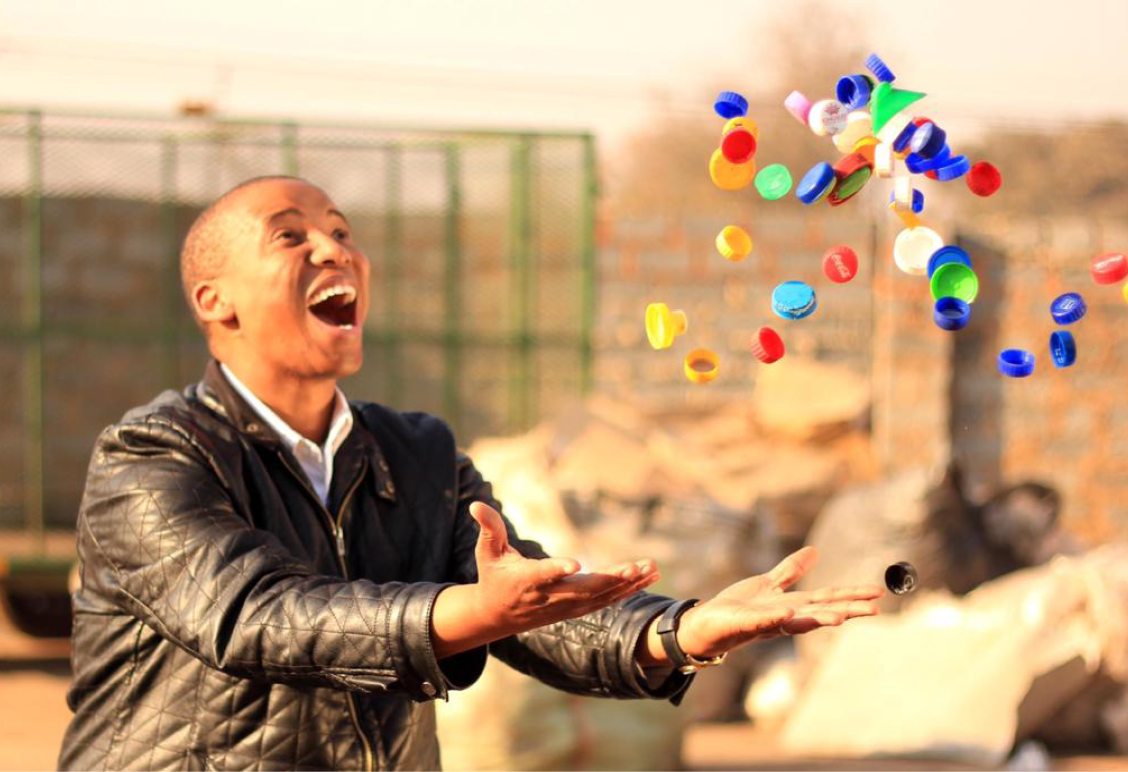
Now, Tshepo Mazibuko, 40, is the renowned owner of K1 Recycling, a township-based waste management company.
Mazibuko recalls how he used to depend on other people to make ends meet as a jobless 29-year-old. “I was frustrated,” Mazibuko says.
He was volunteering at an organisation that helps the needy when he had an encounter with the owner who was originally from Brazil. “We saw the waste pickers passing with trolleys in town and he explained that part of Brazil is clean because of these guys.”
Little did he know that a seed had been planted.
“One day I approached [a waste picker] and he told me how they pick up waste to go and sell it. That just made me crazy because the township is dirty.”
He then started researching recycling and collecting trash for resale.
He explained that instead of sitting at home unemployed, at least he would be doing something and earning some money. He still remembers how excited he was when he bought his first trolley for R200 in 2009. “All along I was looking for work and could not find it, and now I was doing something - even though many did not approve,” he says.
Looking through peopleís bins
For three years, he went through people’s bins looking for any recyclables he could find to trade for a small amount of cash to feed his family.
“Some people thought I was losing it,” he says with a chuckle. He recalls a day when he was looking through a bin when the owner of the house came outside. When he lifted his head, he realized it was a guy he used to go to school with. “He nearly cried and offered me food,” Mazibuko chuckles.
His first pay cheque was about R150 after a hard day’s work. “We would walk about 10km to go sell. I did not make much money but the passion was there.”
After some convincing, he and his wife, Thando, took a chance and bought their first bakkie to transport reclaimers to sell their trash in 2011 and more people demanded his service.
Mazibuko then saw another opportunity to buy the recyclables from the pickers. “That’s when the idea of becoming a Buy-Back Centre came in.”
He registered his business the same year and employed two people. He began applying for enterprise development programmes and luckily scored an opportunity to study a short-course at the Gordon Institute of Business Science (GIBS) after a tough selection process. “This is where I learnt to draft a business plan,” he recalls.
The big break
In 2014, he received his first funding from Anglo Zimele, Anglo American’s South African enterprise and development fund, which assisted in buying bigger baling machines, trucks and forklifts. This assisted the business become more structured and also offered mentorship.
His establishment could now compete with other Buy-Back Centres and his staff increased to 10. The dream has always been to become a plastic processer and he fought to the bitter end to achieve his goal.
Mazibuko had his break when the Department of Environment, Forestry and Fisheries (DEFF) awarded him a R5-million grant in 2016. Thanks to the DEFF, K1 Recycling could now afford to buy processing machines from China and his business has been growing in leaps and bounds.
K1 Recycling now employs 21 people and has an indirect work force of over 1 000 waste pickers on their books.
Their volumes improved and the centre collects over 80 tons of waste per month, while the turnover went up to R2 million per year. “We were now paying people much more, meaning people were collecting more [recyclables]. That changed our business.”
He also hired a university engineering graduate to operate and maintain the machines.
K1 Recycling has also received recognition from big companies he has since collaborated with and who have a footprint overseas as part of the SWITCH Africa Green, a European Union-funded programme implemented by United Nations Environmental.
The businessman is optimistic about the green economy, which President Cyril Ramaphosa believes is one of the sectors that can aid job creation and boost the country’s finances.
“It is exciting because there is a lot of potential. There are more jobs that can be created especially for us black people. We grew up not knowing much about waste, we did not know we can benefit from it.”
Possibilities are endless for this entrepreneur who has introduced technology where waste pickers can be paid via cellphones, which is safer and convenient than carrying cash. His next adventure is to manufacture end-user products from the recyclables collected in the township and is looking forward to the challenge.
“We believe we are going to increase the job count and keep our environment clean.” ñ SAnews.gov.za
Hani-Khumalo launches online book club
Hani-Khumalo launches online book club SiboneloChris Hani’s granddaughter is helping society to talk about issues that affect them.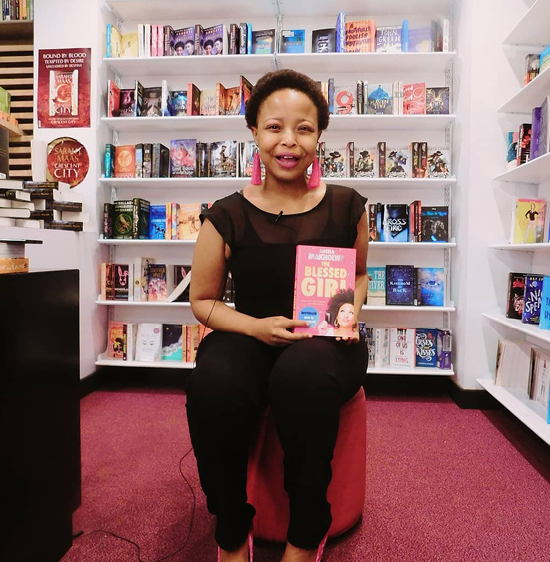
National youth ambassador Nosipho Hani-Khumalo (21) is tackling various issues that affect society, such as gender-based violence (GBV), through a unique online book club.
Khumalo started the Bookarazzi Book Club in partnership with Exclusive Books and Plugcityhype, to highlight serious issues affecting South Africans.
Broadcast online every Thursday, the book club’s web series creates a safe space for people to discuss the pain they feel when they are trapped in difficult situations.
“On my journey of philanthropy and as a youth ambassador, I have become more aware of the pain people carry. Books are a lighter way of introducing the serious and needed conversations that people are often afraid to have at home or with friends because they are embarrassed or ashamed. We want the book club to create a safe space for empowerment and healing.”
The first book in the series, The Blessed Girl, by Angela Mokholwa, is about young girls who get involved in sexual relationships with older men, in exchange for money and possessions.
“The book speaks to what we see in society, where young girls who are struggling financially see their only way out as sleeping with older men. This issue highlights the trend of patriarchy in society, where girls and women believe they cannot succeed without men,” Khumalo says.
At the book club, Khumalo discusses the book, its underlying themes and what they mean.
“We are also going to speak to a psychologist about the book and, at the end of the series, will interview the author to find out why she wrote it and what she wants people to learn.”
Khumalo will also cover books that deal with GBV and other issues. She hopes people will develop a deeper understanding of the topics at hand and be able to relate to the characters in the books.
“We want readers to grow in empathy, understanding and love, because that is the South Africa we need.”
You can watch the Bookarazzi Book Club on Plugcityhype.com and the Plugcityhype YouTube channel. New episodes are released every Thursday at 7pm.
Injury on duty
Injury on duty SiboneloCompensation Fund, occupational injuries or diseases, compensation Fund.
When you sustain an injury while on duty or contract an occupational disease including covid-19, here are simple steps to follow:
1. Report your injury or disease immediately to your employer or supervisor. Your employer is legally responsible for reporting your injury on duty to the Compensation Fund within seven (7) days of receiving notice from you and within fourteen (14) days when it is an occupational disease as well as submitting the necessary forms and documents.
2. When you go to hospital or the doctor of your own choice, you should take the duly completed, signed and dated, Employers Report of an Accident form (W.CI.2 – Part B) from your employer, with you. The employer can also register your claim electronically and give you the claim number for you to inform your doctor.
3. When the doctor gives you the First Medical Report (W.CI.4) and Progress/Final Medical Reports (W. CI.5), you must give them to your employer to send to the Compensation Fund.
4. If you feel that your employer does not cooperate or assist you, or if you think your accident has not been reported to the Compensation Fund, or it is taking too long, go to your nearest Provincial Office or nearest Labour Centre and report this.
5. If you qualify for compensation, you have to submit the following documents to the Compensation Fund:
- Form (W.Ac.33 obtainable at your Provincial Office or your nearest Labour Centre or download if from www.labour.gov.za) must be duly completed and signed by the employee and stamped and dated by the bank
- A certified original copy of your ID
- First page of your bank statement, not older than three months and
- Proof of residence i.e. water and electricity bill, etc.
- These documents should be the ORIGINAL documents and not older than three months.
6. The reporting process for Covid-19 claims are exactly the same as for any other claim. The following documents are required for Covid-19 claims:
- Employer’s Report on an Occupational Disease (W.Cl. 1) duly completed, signed and dated.
- Notice of an Occupational Disease and Claim for Compensation (W.Cl. 14)
- First Medical Report (W.Cl.22)
- Exposure and Medical Questionnaire
- Exposure history (W.Cl.110) and/or any other appropriate employment history which may include any information which may be helpful to the Compensation Commissioner
- Pathology results (RT-PCR Cov -2 RNA) confirming the existence of Covid-19 on sputum, orophanryngeal or nasophanryngeal specimen taken at the time of screening.
7. It is your duty to follow up with the Compensation Fund to check the status of your claim.
For more information, go to your nearest Labour Centre or Provincial Office or call 0860 105 350 or email at cfcallcentre@labour.gov.za
NB: Compensation fund services are free, The Compensation Fund, Working for you!!!!
Land applications being processed
Land applications being processed UrsulaPeople who have applied to government to use state-owned land for farming will not have to wait much longer for the outcome of their application.
Government is moving forward with South Africa’s vitally important land reform process, as it begins to process over
9 000 applications for state-owned land that people will be able to use for farming.
In October, government announced that 529 000 hectares of land, comprising 894 farms in seven provinces, would be advertised. Successful applicants will be given 30-year leases to use the land for agriculture.
Agriculture, Land Reform and Rural Development Minister Thoko Didiza says applications have been received from a variety of people, including emerging farmers, women and farming cooperatives.
“We have mobilised other stakeholders to ensure that the application process is transparent and that applications can be processed. These include farmers’ organisations, non-governmental organisations, faith-based organisations and the United Nations’ Food and Agriculture Organisation,” says Minister Didiza.
She adds she is pleased that the land reform process is building momentum, and that the Expropriation Bill has been tabled in Parliament.
“Land reform plays a critical role in enabling those who are historically disadvantaged to have an asset that gives them a foothold in economic participation. This important Bill will ensure alignment with the Constitution as well as create a clear framework on how expropriation for a public purpose and public interest will be undertaken.”
The Minister pointed out that agriculture will be key to South Africa’s economic recovery.
“As announced by President Cyril Ramaphosa in his Economic Recovery Plan, agriculture is poised to contribute positively to job creation, food security and economic growth. We need to ensure that an enabling environment is created for the sector to succeed.”
Minister Didiza has also been encouraged by the support of organisations to ensure that land is successfully farmed.
“We are encouraged by the interest and support of organisations that are willing to partner with government to make a success of those who have received land from government, either through restitution of land rights or land redistribution.”
Although land is not being made available in the Western Cape and Gauteng, Minister Didiza says that government will still support and implement land reform procedures in these provinces.
Land inquiry process underway
The department has also started a land inquiry process to confirm the rights of individuals and communities who are living on state-owned land.
“Many of these people do not have any form of paper, be it a lease agreement or tenure security, that confirms that the land belongs to them. Some have been working on this land for many years, but have not received any formal recognition,” says Minister Didiza.
She stresses that the purpose of the land inquiry is not to evict individuals from properties.
This is an important process to ensure that we affirm the rights of the individuals concerned, she says.
“The process will ensure proper procedures and is a way of enabling the State to have a record of which farm is occupied by who and what activities are being undertaken on that state-owned land. Our policy and regulatory environment will require certainty in order to eliminate negative perceptions from would-be investors.”
Minister Didiza says a number of farm dwellers and communities have already been met by government officials as part of the process. She urged all stakeholders to report any foul play from such officials.
“Allegations have been made about government officials who have given letters of evictions to individuals and communities and, in some instances, demand bribes. This conduct is unacceptable and criminal. I have advised communities to bring these issues to
and their nearest police station.”
Money can affect your mind
Money can affect your mind SiboneloWith 2020 being one of the toughest years South Africans have ever faced, many people are taking strain when it comes to their finances. This can affect their mental health.
While some of us do not see mental health conditions coming, others acknowledge them but do not get treatment. This could affect their ability to function properly at work and home, says the Credit Ombud, which has received calls from people who threatened to take their own lives because of their debt.
People do not like talking about their finances. We are private by nature and want to portray an image of success. Sadly, this makes depression and the cycle of debt even worse.
Consumers must acknowledge their debt, as ignoring it is a recipe for disaster. Debt does not disappear and it will attract interest.
Tips to handle debt
- Pay your accounts on time every month.
- Pay the full instalment owed each month.
- If you are unable to make a payment, talk to the credit provider to make arrangements.
- Never buy on credit without knowing if you can afford the repayments.
- Try to keep credit repayments to a small percentage of your income.
- Stay informed of your personal credit information.
- Prepare a monthly budget to identify income and expenses. Stick to the plan. Remember to include savings and a year-end treat.
- Pay and close some accounts if you can.
- Pay the smallest accounts first.
Seek Help
- Do not avoid calls or SMSes from credit providers, speak to them and make arrangements. Always make sure they have your correct contact details. If they cannot find you, they will get a tracer to track you. This will cost you more money.
- Do not ignore a letter of demand for payment or a summons to appear in court. If a judgment is made against you, the credit provider has 30 years to collect the debt.
- If your situation remains desperate, seek help from a debt counsellor who is registered with the National Credit Regulator.
If you think you have a mental health condition, visit your nearest clinic and talk to a medical professional.
Contact the Credit Ombud for free assistance relating to credit agreements with non-bank credit providers. Call 0861 66 28 37, visit www.creditombud.org.za, email ombud@creditombud.org.za or send an SMS to 44786.
NPOs must meet legal requirements
NPOs must meet legal requirements SiboneloSouth Africa has over 230 000 registered non-profit organisations (NPOs) that assist government with poverty alleviation and community upliftment. However, many do not know that they must fulfil certain legal requirements.
 Only 33% of registered NPOs in South Africa are compliant with the law.
Only 33% of registered NPOs in South Africa are compliant with the law.
To bolster this figure by generating awareness around the law, the Department of Social Development (DSD) has launched the Know Your NPO Status campaign. The campaign will educate NPOs about the need to comply with the NPO Act by submitting annual reports, which show where they have spent their money and on which activities.
“The DSD invests R7.6 billion per year in NPOs… Compliance with the provisions of the NPO Act assists NPOs to be fully accountable and transparent about the funding they receive,” explains the Social Development Minister Lindiwe Zulu.
NPOs’ annual reports must include a narrative report, annual financial statements and an accounting officer’s report.
The DSD’s Director for NPO Programmes, Lindiwe Madlala, says there needs to be engagement with NPOs to assist them to be compliant. “Many NPOs find the compliance process a little confusing, so it is important to address this issue and ensure that they are in good standing.”
The campaign will also inform NPOs of their tax obligations. “Many NPOs are eligible to be exempt from certain tax requirements, but they need to register as taxpayers and then submit an application for exemption,” says Minee Hendricks from the South African Revenue Service.
Why is it important to comply?
Minister Zulu explains that NPOs that are compliant will be better placed to apply for and receive funding.
“We need to sustain strong partnerships with NPOs to address the countless social ills we face in our communities. It is very important that we are able to measure the real impact that NPOs have and ensure that the funding they receive is benefitting the communities they serve.”
The department will deregister NPOs that have not been compliant for a number of years. “Unfortunately, some NPOs deliberately abuse funds and need to be held accountable. In these cases, we cannot turn a blind eye and expect the problem to disappear.”
For more information, visit www.npo.org.za.
NPOwer provides mental health support
NPOwer provides mental health support SiboneloNPOwer, a first-of-its kind mental health support programme and 24-hour toll-free helpline for non-profit organisations (NPOs), has been launched by Tshikululu Social Investments and the South African Depression and Anxiety Group (SADAG).
The organisation, itself an NPO, offers free mental healthcare and support to all NPOs in South Africa.
NPOwer provides psychological first aid to leaders, staff and volunteers of NPOs, many of whom are experiencing strain and burnout caused by the Coronavirus Disease (COVID-19).
NPOs have always been important in providing support and care to South Africans, a fact further highlighted by COVID-19. Although NPOs provide such crucial services, their resources are often stretched and their teams are overworked and face daily trauma.
“NPOs have always provided help, resources and support to others, but never before has the mental health of our NPOs been prioritised,” says SADAG operations director Cassey Chambers.
Kelly du Plessis, CEO and Lead Patient Advocate of Rare Diseases South Africa, an NPO established in 2013, says it is well known that NPO staff are often impacted by compassion fatigue, due to the emotionally giving dynamic of the sector, compounded by the often personal nature of the services provided.
“During COVID-19, our mental health was further impacted due to the continuous financial stress of a downturned economy, coupled with many additional services needing to be provided to assist the most vulnerable members of society,” she says.
Du Plessis believes that mental health is all too often overlooked or ignored, until it is too late.
“Mental health support needs to be implemented throughout the sector to build resilience, avoid burnout and ensure that the sector can continue to provide much-needed services,” she says.
“There are so many aspects regarding the health of NPOs which we hope to assist with, including reducing burnout and stress and providing key mental health skills to NPO leaders, to ensure they are able to look after the mental health of their staff and build mental wellness going forward,” says Chambers.
The NPOwer programme also includes capacity workshops on NPO-related issues, a dedicated website to house multiple resources and a support network for NPOs.
The toll-free NPOwer helpline is always open, with counselling available in all 11 official languages. You can call 0800 515 515, send an SMS to 43010 or email info@npowersa.org. For more information about the services offered by NPOwer, visit www.npowersa.org.
NRF postgrad funding: Re-imagine your future
NRF postgrad funding: Re-imagine your future UrsulaEnabling young people to further their studies plays a big role in skills development, which leads to employment opportunities and innovation. 
This is according to Dr Thabiso Motaung (PhD), who is a lecturer and supervisor for postgraduate research projects at the Department of Biochemistry, Genetics and Microbiology at the University of Pretoria.
Motaung (34), who is originally from QwaQwa in the Free State, is a beneficiary of the National Research Foundation (NRF) Postgraduate Scholarship.
“The NRF funded my Master of Biotechnology between 2009 and 2010. Because of this opportunity, I was able to complete my dissertation in the identification of yeast fungal strains of clinical, medical and pharmaceutical significance,” says Dr Motaung.
He was also lucky enough in 2011 to obtain a scholarship from the NRF to do a doctoral thesis, and he was nominated for additional NRF funding between 2016 and 2019 as a postdoctoral fellow with the Agricultural Research Council and the South African Sugarcane Research Institute.
“The funding period from doctoral to postdoctoral years was indeed life-changing for me as it offered a rare and exciting opportunity to develop skills and facilitated my inauguration into the challenging academic world,” says Dr Motaung.
He believes education enables youngsters to escape challenges such as poverty, drug addiction and criminal tendencies, all of which affect South African youth, especially in townships and rural areas.
How to apply?
The Department of Science and Innovation and the NRF are calling for new applications for NRF Postgraduate Student Funding for the 2021 academic year. The closing date is 18 December 2020.
According to the NRF, all continuing students who are eligible for a second or third year of funding must submit a progress report and not a new application.
The NRF minimum academic requirement for postgraduate funding is 65%. Applicants for honours, masters and doctoral funding must be 28, 30 and 32 years of age or younger respectively in the year of application.
Full-cost-of-study bursary applicants must be South African citizens or permanent residents who are either financially needy (combined household family income less or equal to R350 000 per annum), living with a disability or exceptional academic achievers.
Partial-cost-of-study funding will be awarded to 5% of international students and South Africans who do not qualify for full funding but meet other minimum funding criteria.
Scholarships are intended to support honours, masters and doctoral candidates to pursue studies in all areas of science, engineering, technology, social sciences and humanities.
Partnering to improve school infrastructure
Partnering to improve school infrastructure UrsulaThe Motsepe Foundation has committed over R84 million to help improve infrastructure at underserved schools. 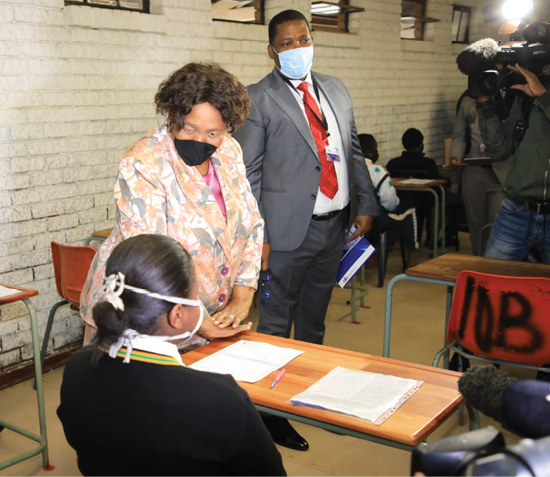
Social partners such as the Motsepe Foundation help the Department of Basic Education address challenges of inadequate school infrastructure.
Basic Education Minister Angie Motshekga expresses gratitude to the foundation, which recently donated R300 000 to each of the 27 public schools in Soweto so that they can address challenges that affect teaching and learning.
In total, 283 schools across the country are expected to receive the same donation.
“We are acutely aware of the enormous backlogs in the provision of the necessary infrastructure to schools in disadvantaged communities. As the government, we are unable to meet all these growing educational needs, hence our partnership with the private sector, including the Motsepe Foundation,” the Minister says.
Sekano-Ntoane High School in Soweto is one of the schools that received the donation. Deputy Principal Pinky Maluleka says three projects have been earmarked to improve the school facilities.
She says the school is over 50 years old and its roof leaks and needs to be replaced.
“We also need to upgrade our toilets because we lose a lot of money by constantly fixing one thing after the other,” she adds.
Maluleka says the school also needs to invest in security because it has had a few break-ins in the past.
She says because this is a no-fee school, which depends on government to keep the school running, whenever there are break-ins, the school relies on government for repairs and that sometimes takes time.
“The thieves are targeting school nutrition products, so we need to secure our facilities and install security cameras,” she explains.
The school is one of the oldest in Soweto and has produced many political leaders, including President Cyril Ramaphosa and Minister Motshekga. It is currently providing education to 1 300 learners and has 27 teachers and is one of the top achievers in its district.
Minister Motshekga says changing the fortune of South Africa requires a collective effort and encourages more business people to invest in the future of the country.
Pig farm back on track after lockdown
Pig farm back on track after lockdown SiboneloKhulile Mahlalela (32), a resilient pig farmer from Nkangala in Mpumalanga, is picking up the pieces after her business was hit hard by the Coronavirus Disease (COVID-19). 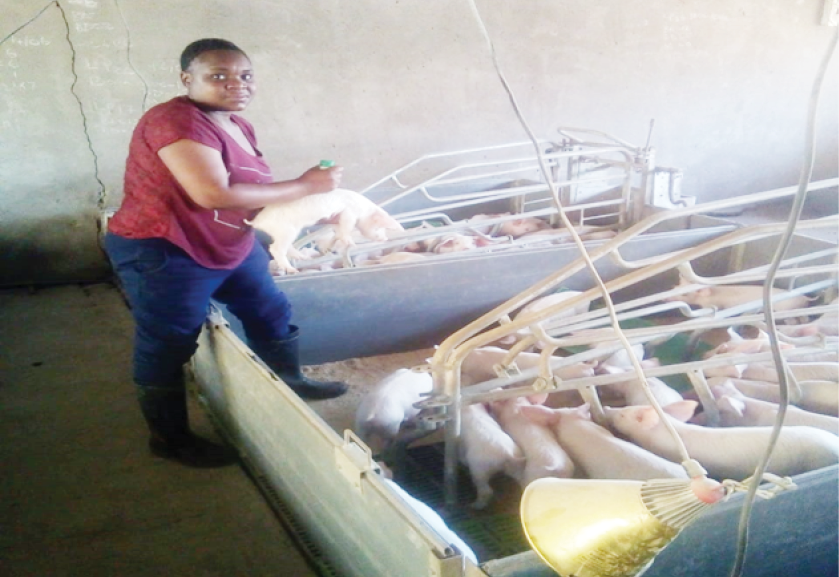
Mahlalela founded Legend Piggery (Pty) Ltd in 2015, after obtaining a Diploma in Animal Production from Mangosuthu University of Technology.
Before starting her business, Mahlalela volunteered at a local farm to gain knowledge. She was soon employed as a supervisor, but left in 2015 to start her own farm.
Mahlalela started operating on leased land, with three pigs. In 2017, she received 11 pigs from the provincial Department of Agriculture, Rural Development and Land Reform’s Masibuyele Esibayeni Programme.
“I breed and sell pigs. I also sell pork to community members and abattoirs,” says Mahlalela.
Before the COVID-19 lockdown, Mahlalela had 152 pigs. “The lockdown hit us hard. The price of pork went down drastically during the past few months,” she says.
As a result, Mahlalela kept eight pigs and sold the rest. She started breeding again when the lockdown regulations eased and also bought 20 pigs to get back to business.
Mahlalela initially wanted to be a geologist, but did not get the matric marks she needed. Her second option was to study agriculture, as she grew up in a family of subsistence farmers.
“I have always known that I wanted to run a business, especially in a field that contributes to food security and creates jobs for locals, because these are real problems in South African communities.
“I fell in love with farming at an early age. My maternal grandmother used to wake my siblings and I up at 4am to plough fields or take weeds out of her food gardens,” she says.
In 2018, Mahlalela attended a six-week meat processing training programme in China, through the Department of Agriculture, Land Reform and Rural Department. In 2019, she received the New Commercial Farmer award from Agricultural Writers SA.
She also received funding from the National Youth Development Agency, which she used to buy equipment and animal feed.
She encourages other young entrepreneurs to never give up on their businesses and to tackle their challenges at their own pace, as
every little effort will yield results.
Protect your skin from the sun
Protect your skin from the sun SiboneloDespite various myths, anyone can get skin cancer. 
With Skin Cancer Awareness Month taking place from 1 December to 31 January, Vuk’uzenzele highlights the dangers of skin cancer and explains how you can protect yourself from the sun.
“Skin cancer can occur in anyone, despite their race, age and gender. However, if diagnosed early, it can be treated,” says Dr Khensani Ngobeni-Mkize, a Mbombela-based specialist dermatologist (skin doctor).
Sun damage to the skin starts in childhood and poor sun protection puts children at risk for skin cancer later in life.
“While there are various types of skin cancer, the three most common ones are basal cell carcinoma (BCC), squamous cell carcinoma (SCC) and malignant melanoma (MM).
“There are also two main categories of skin cancer, namely melanomas (spreads to other parts of the body) and non-melanomas (do not spread),” explains Dr Ngobeni-Mkize.
BCCs are common and most grow slowly. They can start as small, red, shiny spots that sometimes bleed; be flat and scaly; be white, waxy bumps; or be brown or black in darker skinned people. They usually develop on the head, neck and chest.
SCCs can look like a firm, red bump on the face, lower lip, ears, neck, hands or arms; a flat sore with a scaly crust; a raised area on a scar; or a sore or white patch in the mouth.
MMs, which often look like or grow from moles, are the most dangerous form of skin cancer, as they can spread to other parts of the body and result in death. The majority are black or brown, but they can also be various other colours. Warning signs include a mole with unequal sides, blurred edges, a variety of colours, that is larger than 6mm and changes in size or shape.
Protect yourself from the sun
“Skin cancer is caused when the sun’s rays penetrate the skin, changing skin cells. If the cells are not repaired by the body, they multiply, grow and cause skin cancer,” says Dr Ngobeni-Mkize.
“The early warning signs of cancer include a fast-growing lump, scaly patch, mole changes and non-healing sores,” she adds.
You can protect yourself from the sun by:
- wearing a broad-brimmed hat.
- wearing a light scarf to protect the neck.
- applying broad-spectrum sunscreen to protect the skin. it must also contain minerals and be water resistant. apply sunscreen 20 minutes before sun exposure and reapply frequently.
- avoiding the sun between 10am and 3pm.
- drinking water.
- eating a well-balanced diet.
If you are worried about any suspicious skin lesions, visit your local clinic and speak to a dermatologist.
Rebuilding the South African economy
Rebuilding the South African economy JoyAs government moves rapidly to address the country's economic recovery, the President has urged people to follow all COVID-19 health and safety protocols.
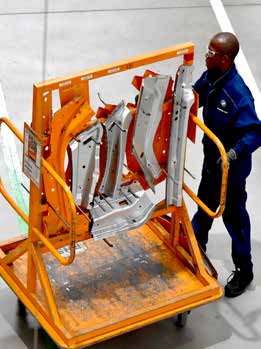 The Coronavirus Disease (COVID-19) outbreak has had a significant impact on our economy and on the lives of millions of South Africans. But now, with a vaccine closer to reality and government developing a comprehensive economic recovery plan, the focus is on emerging from this time of hardship.
The Coronavirus Disease (COVID-19) outbreak has had a significant impact on our economy and on the lives of millions of South Africans. But now, with a vaccine closer to reality and government developing a comprehensive economic recovery plan, the focus is on emerging from this time of hardship.
President Cyril Ramaphosa’s recent address to the nation showed that government is committed to opening up and rebuilding the economy, while at the same time preventing a significant spike in COVID-19 infections.
Caution still required from South Africans
While most lockdown restrictions have now been lifted and the number of new infections and hospitalisations has stabilised, President Ramaphosa warned that South Africans still need to protect themselves to prevent a second wave.
“Many countries are in the midst of a second wave of infections, which has often been more severe than the first. COVID-19 is far from over,” he said.
President Ramaphosa said that South Africans need to be especially careful as the festive season nears.
“Of course, with the festive season approaching, it is understandable that we will want to be with family and friends. It has been a stressful and traumatic year. We want to socialise and connect with each other. But this doesn’t mean we should let our guard down. We must remember that every additional person we come into contact with increases the chances of transmission.”
President Ramaphosa stressed the importance of washing hands, wearing a mask and social distancing.
Interventions to deal with hotspots
 The Eastern Cape is an area of concern for government, with cases in the province rising, indicating a possible second wave of infections.
The Eastern Cape is an area of concern for government, with cases in the province rising, indicating a possible second wave of infections.
The President said that to deal with surges in infections, government is implementing a resurgence plan in partnership with the World Health Organisation.
“Interventions include primary healthcare outreach teams to intensify contact tracing, daily community mobilisation, ensuring the readiness of health facilities and being ready to respond to possible cluster outbreaks.”
Government has also harnessed the use of technology to provide South Africans with the information they need to protect themselves from the virus.
“I call on each of you to join the 700 000 South Africans who have downloaded the COVID Alert SA mobile app. The COVID Alert app can notify you if you have been exposed to the virus – whether it is in a taxi, a shopping mall or a social gathering – and it does so without sharing your location or any personal information,” President Ramaphosa explained, pointing out that the app is free.
“By downloading the app, you help to make the virus visible and break the chain of transmission. We would like to appeal to all organisations to encourage their staff and visitors to download the app when they enter their offices, shops, schools, universities and other enclosed spaces.”
Coming closer to a vaccine
The development of an effective COVID-19 vaccine will be one of the biggest milestones in fighting the disease.
President Ramaphosa said that it was highly encouraging that vaccines are now close to becoming a reality, with research suggesting that some may be more than 90% effective. He stressed that South Africa is working hand-in-hand with pharmaceutical companies to make millions of vaccine doses available in our country.
“One of the leading pharmaceutical companies in the world, Johnson & Johnson, has entered into a preliminary agreement with a local company, Aspen Pharmacare, to manufacture and package its candidate vaccine. Aspen has capacity to manufacture 300 million doses of the candidate vaccine at its Nelson Mandela Bay plant. This is a life-saving medical product that will be needed across the world, which will be manufactured by South African workers.”
Accelerating economic recovery
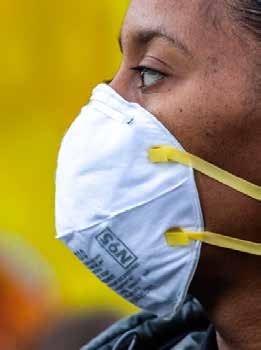 Government provided emergency relief to millions of South Africans during the pandemic, and now the focus is shifting towards widespread economic recovery, through the Economic Reconstruction and Recovery Plan.
Government provided emergency relief to millions of South Africans during the pandemic, and now the focus is shifting towards widespread economic recovery, through the Economic Reconstruction and Recovery Plan.
“As our economy has been steadily opening up and restrictions on movement and activity have been eased, we have been able to turn our attention from these emergency measures towards an ambitious plan of economic reconstruction,” President Ramaphosa said.
Priorities for the economic recovery plan include infrastructure development, drives to attract investment, growth of small businesses, expanding public works programmes and fighting crime and corruption.
“As we transition to a new phase in our response, the only way forward is a rapid and sustained economic recovery. We are focusing relentlessly on the implementation of our plan, pursuing a few priorities with the highest impact and ensuring that we deliver on these.”
Recovery on the horizon for SA
Recovery on the horizon for SA JoyThe jacaranda trees are in full bloom across the nation’s capital, heralding the start of summer. After a long and difficult winter, the beginning of a new season should fill us with optimism.
When the National State of Disaster was declared in March, our immediate priority was to contain the spread of the virus and provide emergency relief to citizens, communities, workers and businesses.
Over the course of eight months and with the support of our social partners, we rolled out a comprehensive set of measures to limit the social and economic impact of the pandemic.
We massively expanded social protection on a scale that has never been attempted before in this country. We are one of the few countries in the world where the right of access to social security is enshrined in the Constitution, and we can be proud that during this grave crisis we gave practical expression to this right in many ways.
 In addition to our existing social grants, which reach more than 17 million people every month, we topped-up the Old Age, Disability and Child Support grants. We rolled out a Special Coronavirus Disease (COVID-19) Social Relief of Distress Grant, which has reached some six million people to date. This was done within weeks of the National State of Disaster being declared.
In addition to our existing social grants, which reach more than 17 million people every month, we topped-up the Old Age, Disability and Child Support grants. We rolled out a Special Coronavirus Disease (COVID-19) Social Relief of Distress Grant, which has reached some six million people to date. This was done within weeks of the National State of Disaster being declared.
The scale of such an undertaking cannot be understated. To bring this system online there was extensive collaboration between the South African Social Security Agency, South African Revenue Service, Home Affairs and many others.
We set up a fully automated application and disbursement process, and integrated multiple databases, including the National Population Register and the Unemployment Insurance Fund (UIF) database. We set up new application channels like WhatsApp and USSD, and created systems with the commercial banks to enable banking detail verification. This is a remarkable achievement in a very short space of time.
Alongside the measures we took to protect and sustain livelihoods, we also supported ailing businesses. We provided relief to small businesses in the form of debt relief, finance, tax payment deferrals and other instruments.
We implemented a COVID-19 Loan Guarantee Scheme to enable businesses to meet their operational expenses during the lockdown, and are currently looking at how this scheme can reach more companies in need.
We provided income protection to workers and relief to business owners through the Temporary Employer Relief Scheme administered by the UIF.
These were all in direct response to an emergency and were by nature temporary. Some are now coming to an end, while others have been extended as the labour market recovers.
The measures we implemented went a long way towards protecting our society from the harsh winds of COVID-19. The additional grants helped to prevent millions of people from falling below the food poverty line.
Had we not intervened to secure livelihoods and save businesses, the living conditions of our people and the circumstances of thousands of businesses would have been considerably worse.
Now we are in a transition from relief to recovery.
The emergency measures we put in place have laid a firm foundation on which to rebuild our economy. As our focus now shifts to the implementation of the Economic Reconstruction and Recovery Plan, our priority will be to stimulate growth and create jobs.
There has already been progress in a number of areas.
We are seeing new funding commitments for infrastructure development following an infrastructure project roundtable last week.
A number of employment programmes under the Presidential Employment Stimulus have started. We are pushing ahead with economic reforms in areas such as energy and telecommunications.
Plans are being converted to action and commitments are being reflected in jobs and opportunities.
It is all the more critical at this time, more so with the festive season approaching, that we do not become the architects of our own undoing.
The greatest vigilance is required from us all to keep the virus at bay.
A resurgence at any scale will not just dramatically reverse our health gains. It will choke the green shoots of economic recovery that have emerged, and take us back from spring to winter.
To prevent a second wave of COVID-19 infections, we must observe the public health guidelines that remain in place.
When we fail to wear a mask at a social gathering, when we attend crowded events, we are not only putting ourselves and others at risk. We are also putting our economic recovery in jeopardy.
Let us all continue to play our part.
The positive actions of wearing a mask, of maintaining social distancing and of regular hand washing helped us overcome the worst effects of the pandemic. They are still our best defence.
Let us remember the sacrifices we all had to make to contain the spread of the virus in the early days.
Even as most social and economic activity has resumed, we must still observe all the health measures. This is absolutely necessary if we are to rebuild our economy and put this crisis behind us.
Safe Space for Men to fight GBVF
Safe Space for Men to fight GBVF UrsulaGovernment launches Safe Space for Men and a community care centre for vulnerable children in North West. 
Men and boys from Letlhakeng La Ga Sedumedi village in Tlokweng in the North West can now play a more active role in contributing towards national efforts to combat the scourge of gender-based violence and femicide (GBVF).
The recent launch of the Safe Space for Men in the area, also known as The Lounge, was led by Social Development Deputy Minister Hendrietta Bogopane-Zulu, to give males of all ages an opportunity to hold each other accountable and engage in open and non-judgmental conversations.
It will also enable them to find ways to address social ills, such as the spread of HIV and alcohol and substance abuse, among others; and will serve as a space where they can access services such as HIV testing and psychosocial support.
This is important because research shows that most men are reluctant to seek treatment or services in public facilities, says the department.
Young boys will also be paired with positive male role models in their communities, to mentor and guide them towards positive masculinities and healthy lifestyles.
Speaking on behalf of Tlokweng Tribal Authority, Molotsi Motsatsi says this will be of great benefit to villagers and residents of surrounding communities.
“We need men and boys to come together and put an end to the abuse of women and young girls. This facility is much needed and will go a long way in yielding positive results for all community members.”
To complement the initiative, the department also launched the Letlhakeng Community Care Centre to provide psychosocial care and support services and skills development to orphans and vulnerable children, including those from child-headed households.
Letlhakeng is the third of the six community care centres being constructed in the province. The department is building 17 centres in total, thanks a donation of over €9 million from KfW, the German state-owned development bank. These are in various stages of development in KwaZulu-Natal, Limpopo and North West.
“The community care centres will also serve as service points, bringing government services to the doorstep of rural communities,” said Deputy Minister Bogopane-Zulu.
Self-taught visual artist thrives
Self-taught visual artist thrives SiboneloA young artist has taken his success into his own hands after being turned away by galleries.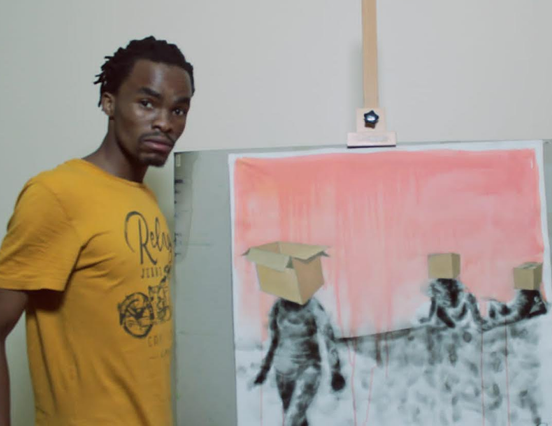
Self-taught artist Anathi Nkanyuza (25) founded a mobile art gallery to showcase his work after established galleries turned him away because he was not professionally trained.
Born and raised in Mbulukhweza in Tsomo in the Eastern Cape, Nkanyuza established Elpee's Art Gallery in Tshwane in 2013. The gallery specialises in pop-up and gallery-based exhibitions.
“I also noticed a need to create a platform for emerging artists and to collaborate with other artists,” says Nkanyuza, who regards himself as a socio-political artist and is well known for his smoke or fumage art. Smoke art drawings are created with smoke using different fire-starting tools.
“My work is mostly influenced by social issues and political factors. I specialise in visual art, such as drawing or sketching, using smoke or fumage, pastels and charcoal. I also specialise in painting with watercolour, acrylic and oil paints and sculpting with clay, paper and wood,” says Nkanyuza.
Since discovering smoke or fumage art in 2015, his focus is mainly on mastering smoke, but he uses other mediums for commissioned work.
The Fourth Industrial Revolution has come with great benefits for Nkanyuza’s gallery, which mostly markets its work on social media.
“Social media platforms are an easy way for brands to push their products. I have built a strong brand for myself, using only social media. That is how big media houses got to know about me,” he says.
Nkanyuza participated in the South African State Theatre’s Education, Youth and Children Theatre in 2017, which played a big role in uplifting him as an artist and gave him an opportunity to fulfil his long-term dream of going to the National Arts Festival in Makhanda, in the Eastern Cape.
He also received funding from the National Youth Development Agency, which
helped him to buy the equipment needed to start an online show. “I was able to transition into the digital space with ArtFfection – a reality show where I collaborate with emerging artists to create art,” he says.
Watch season one on YouTube. Search for Elpee’s Art Gallery or ArtFfection. For more information, email anathi.nkanyuza@gmail.com or send him a WhatsApp at 078 984 8761.
Software developer improves passenger safety
Software developer improves passenger safety UrsulaJames Baloyi is a young man from Roodepoort who is currently employed in the high-potential field of software development, and is also a mobile app developer, creating useful apps that provide a real benefit to users. 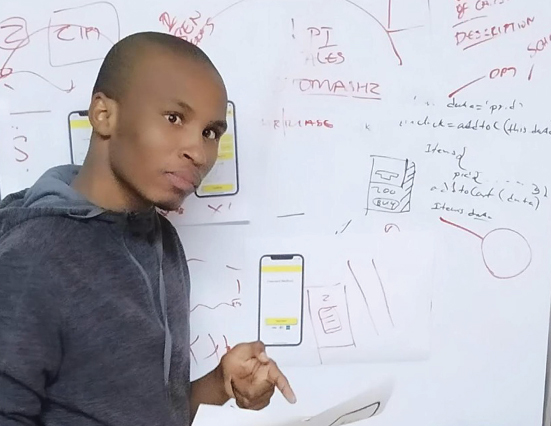
Baloyi (24) and fellow software developer Derik Sadiki recently created a mobile app called DCHECK. The app seeks to create a safer experience for people using e-hailing services. An e-hailing service is a form of transportation pickup requested with a virtual device such as a cellphone. The app allows users to file reports about their trips, which other users of the app can then view.
“I have always wanted to build software that benefits people,” says Baloyi.
After some deep thinking, Baloyi decided that he wanted to create an app that would play a small part in preventing gender-based violence and keep users of e-hailing services safe.
DCHECK users can give reports about the driver by using the number plate of the vehicle. The app also contains a panic button in case users finds themselves in a dangerous situation.
“The user stores two contacts as emergency contacts. When they press the panic button, the live location and numberplate of the vehicle will be shared to the contacts,” Baloyi explains.
Getting into app development
Baloyi was strong at maths and science in school, and initially wanted to study civil engineering, but he got bored with it quickly.
“This is when I decided that maybe I should start exploring software and app development. I went to WeThinkCode and did their bootcamp, and then started figuring things out a bit on my own, researching and practising coding. I freelanced for a while and then landed my first job,” says Baloyi.
Baloyi explains that you do not necessarily need a degree to become a software developer.
“Over the past few years, the IT industry has changed. It used to be that you absolutely had to have qualifications to find a job. But as tech companies started getting bigger, this faded away. Today, you just need a lot of passion, and tech companies will give you the opportunity to show that you can meet the requirements of the job.”
At the same time, Baloyi says that people who want to become software developers need to be willing to rapidly expand their skills.
You can find the DCHECK app at the Google Play Store or Apple iStore.
The correct HIV treatment is essential
The correct HIV treatment is essential UrsulaWhile traditional healers play an important role in people’s physical and spiritual well-being, it is vital that people with HIV and AIDS get the right treatment to improve their quality of life. 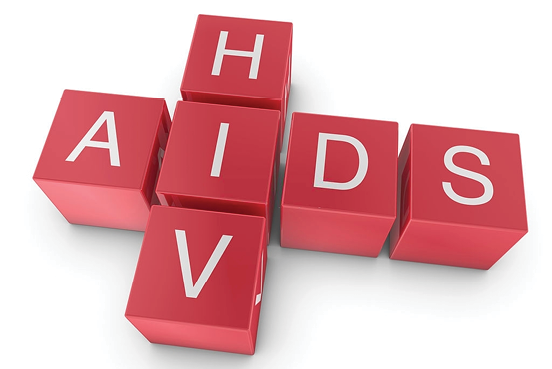
Government has invested billions into developing one of the biggest HIV and AIDS treatment programmes in the world, with hospitals and clinics around the country offering safe, free antiretroviral therapy (ART) that has proven effective in managing HIV and extending a patient’s life.
Seek treatment early
Dr Thembelihle Zuma from the Africa Health Research Institute, says many people are reluctant to approach clinics and hospitals for testing and treatment of HIV, preferring to visit traditional health practitioners.
“While large numbers of people are being initiated on ART, several research studies have found that the use of traditional health practitioners continues to delay individuals from timeously obtaining and remaining in care. This leads to poorer health outcomes,” she says.
Dr Zuma says that if traditional healers see patients who have HIV symptoms, they are legally obliged to refer them to a hospital for testing.
“Despite the health regulation, healers acknowledge that they might unknowingly treat HIV if a patient lies about their status or refuses to test.”
Traditional medicine and ART
While patients should be placed on appropriate antiretroviral medication, traditional healers can play an important support role.
“If trained and effectively engaged, traditional healers can help increase early diagnosis and therapy uptake, with prompt referrals, adherence support and avoidance of herb-drug interactions, ultimately improving health outcomes for people with HIV,” says Sizzy Ngobeni, a field researcher with experience in traditional healership, from the Wits School of Public Health.
She adds that it is important for patients to approach traditional healers who have been trained in HIV and AIDS.
Lesley Gittings, an associate researcher at the University of Cape Town’s AIDS and Society Research Unit, says that traditional medicine practitioners can work hand-in-hand with the public and private health sectors.
She explains that evidence suggests that combining traditional and biomedical healing can provide patients with more effective and holistic healthcare.
Warn kids about pornography
Warn kids about pornography UrsulaWhile the Internet has many advantages it also comes with dangers, especially for children who could be exposed to or groomed for child pornography, another form of gender-based violence. 
Child pornography is a form of child sexual exploitation. It occurs when a person or company uses a child to make pornographic material for a reward or money.
Pornography is harmful for children to watch because it stimulates a sexual interest that may not be appropriate for their age, stage and level of development. It may also influence and shape their sexual orientation and activity.
Sometimes adults and older children, who have a sexual interest in children, expose children to pornography on purpose so that the child becomes interested in sexual activities. They also sometimes develop a relationship with the child’s parents, to gain access to the child, or contact children via the Internet.
This is often the start of the grooming process and the child may be drawn into a relationship that becomes abusive.
Parents, take note
To keep children safe, parents should discuss responsible Internet use with them. Parents should also:
- place the computer in a room shared by all family members.
- install an Internet filter which blocks harmful websites.
- set clear rules.
- discuss the consequences of visiting ‘off limits’ websites.
- develop your own internet skills and monitor the websites that your child visits.
- tell children that they should never give anyone they meet on the internet their personal details.
- tell children they should never agree to meet anyone they meet on the internet without your permission.
If you find your child watching pornography:
- remain calm.
- talk openly with your child about your concerns.
- explain why watching pornography is potentially harmful.
- where images of child pornography are involved, explain the process and impact of child abuse. make it clear that children are abused in the making of child pornography.
If you are concerned about your sexual interests and believe you could harm children sexually, call the toll-free Childline Crisis Line at 08000 55555.
If you come across child pornography on the Internet, report it to the Childline Pornography Hotline at 0800 148 148.